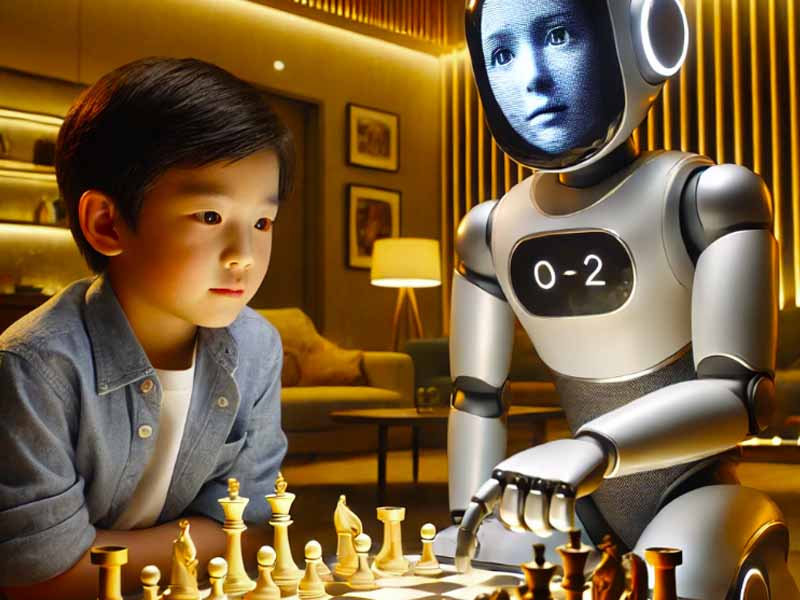
Resilienceapac – The AI boom in China is reshaping daily life, bringing intelligent technology into homes in ways once thought impossible. Eight-year-old Timmy experiences this firsthand as he battles a chess-playing robot in his Beijing apartment. More than just a toy, the AI-powered robot acts as both a companion and a teacher, challenging him to improve his skills.
Timmy’s mother, Yan Xue, sees AI as an inevitable part of the future. “Children should get to know it as early as possible. We should not reject it,” she says. Her son’s robot, priced at $800, not only plays chess but also teaches Go, another strategic board game. Its creators plan to expand its capabilities, adding language tutoring and other educational features.
This growing integration of AI into daily life aligns with China’s ambitious goal of becoming a tech superpower by 2030. Schools in Beijing are already introducing AI courses for primary and secondary students, ensuring the next generation is well-versed in the technology driving the AI boom.
“Will’s Musical Revolution: A Game-Changer in Theatre”
China’s government is investing heavily in AI development, further propelling the AI boom. In 2017, the Chinese Communist Party declared AI as “the main driving force” behind national progress. Since then, investments have surged, with Beijing planning to spend 10 trillion yuan ($1.4 trillion) over the next 15 years to stay ahead in the global tech race.
Despite U.S. trade restrictions and sanctions on Chinese firms, China’s AI sector continues to thrive. DeepSeek, a chatbot launched in January, shocked industry experts by demonstrating capabilities on par with its Western counterparts. With over 4,500 AI firms competing for dominance, innovation in China is accelerating at an unprecedented rate.
One of China’s key advantages in the AI boom is its vast pool of STEM graduates. In 2020, more than 3.5 million Chinese students earned degrees in science, technology, engineering, and mathematics—more than any other country. This talent influx is fueling AI advancements across industries, from robotics to smart hardware.
Tommy Tang, a representative of SenseRobot, a company specializing in AI-powered chess robots. Has seen firsthand how global perceptions of Chinese technology are changing. “People assume I’m from the U.S. or Europe. They’re surprised when I say I’m from China,” he says. SenseRobot has sold over 100,000 units and recently secured a contract with U.S. retail giant Costco. Demonstrating China’s growing influence in the AI market.
Other companies, like Shanghai-based Whalesbot, are developing AI-driven educational toys to introduce coding to children as young as three. “Other countries have AI education robots too, but when it comes to competitiveness and smart hardware, China is doing better,” says Abbott Lyu. The company’s vice president.
The success of DeepSeek and other homegrown AI firms, dubbed China’s “six little dragons,” showcases the nation’s rapid technological advancements. As AI continues to evolve, China is positioning itself as a global leader. Proving that its AI boom is not just hype it is a transformative force shaping the future.
“US Tariffs on India: A Bitter Pill to Swallow”
Resilienceapac - Modernizing Australia’s healthcare system has taken a significant step forward with the government’s announcement of a $228.7 million…
Resilienceapac - Asia’s children are facing an alarming future as climate change accelerates. According to a recent UNICEF report, by…
Resilienceapac - Best Island in Asia Pacific Bali has once again proven its status as a world-class destination by securing…
Resilienceapac - Empowering women has long been a crucial step toward achieving true gender equality. The Asia Pacific Forum on…
Resilienceapac - The AI Revolution is transforming industries at an unprecedented pace. With 50% of organizations now adopting Artificial Intelligence…
Resilienceapac - China's Market Shift is reshaping global trade dynamics as the nation actively reduces its dependence on the United…
